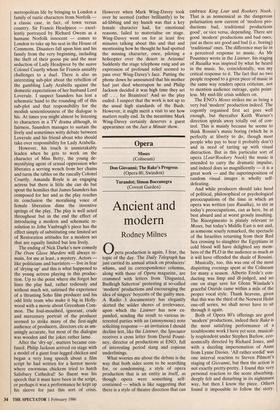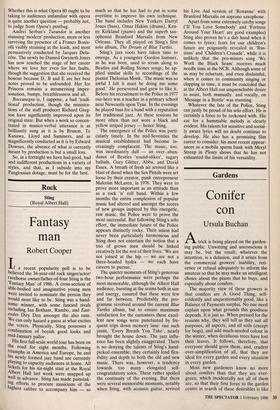Opera
Moses
(Coliseum)
Ancient and modern
Rodney Mdnes
0 pera production is again, I fear, the topic of the day. The Daily Telegraph has just carried its annual attack on producers' whims, and its correspondence columns, along with those of Opera magazine, are crammed with letters from 'Disgusted, Budleigh Salterton' protesting at so-called `modern' productions and encouraging the idea of singers' boycotts of the guilty men. A Radio 3 documentary has elegantly skirted the wilder shores of irrelevance, upon which the Listener has now ex- panded, sending the result to various in- terested parties with an (anonymous) note soliciting response — an invitation I should decline lest, like the Listener, the Spectator receives a cross letter from David Pount- ney, director of productions at ENO, full of interesting period slang and copious underlinings.
What worries me about the debate is the way that both sides seem to be searching for, or condemning, a style of opera production that is an entity in itself, as though opera were something self- contained — which is like suggesting that there is a style of theatre direction that can embrace King Lear and Rookery Nook. That is as nonsensical as the dangerous polarisation now current of 'modern pro- ductions bad, traditional productions good', or vice versa, depending. There are good 'modern' productions and bad ones, just as there are good and bad (i.e. boring) `traditional' ones. The difference may lie in a perceived response to music. As Mr Pountney wrote in the Listener, his staging of Rusalka was inspired by what he heard in the music. So, coincidentally, was my critical response to it. The fact that no two people respond to a given piece of music in the same way renders opera criticism, not to mention audience outrage, quite point- less. My mid-life crisis soldiers on.
The ENO's Moses strikes me as being a very bad 'modern' production indeed. The cogently organised first act goes well enough, but thereafter Keith Warner's direction spirals away totally out of con- trol. This is mainly because he seems to think Rossini's music boring (which he is perfectly at liberty to do, though most people who pay to hear it probably don't) and in need of tarting up with visual distraction. But in this particular sort of opera (Lear/Rookery Nook) the music is intended to carry the dramatic impulse, and indeed does so magnificently — it is a great work — and the superimposition of random visual images is wholly self- defeating.
And while producers should take heed of political, philosophical or psychological preoccupations of the time in which an opera was written (see Rusalka), to stir in today's preoccupations, can as here, be at best absurd and at worst grossly insulting. The Risorgimento is plainly relevant to Moses, but today's Middle East is not and, as someone sourly remarked, the spectacle of the Israelites returning from their Red Sea crossing to slaughter the Egyptians in cold blood will have delighted any mem- bers of the PLO in the audience as much as it will have offended the shade of Rossini.
Musically, too, this was one of the most dispiriting evenings spent at the Coliseum for many a season. Alberto Erede's con- ducting was limp and ill-judged, and no one on stage save for Glenn Winslade's graceful Osiride came within a mile of the proper vocal style. Thank heavens, given that this was the third of the Norwest Hoist one-off series, we shall never have to sit through it again.
Both of Opera 80's offerings are good `modern' productions, indeed their Rake is the most satisfying performance of a troublesome work I have yet seen, musical- ly resplendent under Stephen Barlow, eco- nomically directed by Richard Jones, and with a dazzling impersonation of Anne from Lynne Davies. 'All rather sordid' was one interval reaction to Steven Pilmott's staging of Giovanni, but then the action is not exactly pretty-pretty. I found this very personal reaction to the score absorbing, deeply felt and disturbing in its nightmare way, but then I know the piece. Others found it impossible to follow the story. Whether this is what Opera 80 ought to be taking to audiences unfamiliar with opera is quite another question — probably not, to judge from Opera's postbag.
Andrei Serban's Turandot is another stunning 'modern' production, more or less surviving the presence of a Franco Bonis- olli visibly straining at the leash, and most persuasively conducted by Jacques Dela- cOte. The newly be-Damed Gwyneth Jones has now reached the stage of her career where we love her even for her faults, though the suggestion that she received the honour because D, B and E are her best notes proved to be unfounded. Her Ice Princess remains a mesmerising imper- sonation, bumps, breathlessness and all.
Boccanegra is, I suppose, a bad 'tradi- tional' production, though the ministra- tions of the staff producer Richard Greg- son have significantly improved upon its original state. But when a work so concen- trated in musico-verbal utterance is as brilliantly sung as it is by Bruson, Te Kanawa, Lloyd and Summers, and as magnificently conducted as it is by Edward Downes, the absence of what is currently meant by production is but a small loss.
So, in a fortnight we have had good, bad and indifferent productions in a variety of styles, and that, as I subside into my Panglossian dotage, must be for the best.















































 Previous page
Previous page